Earthwatch Ambassadors Travel to Brazil and Costa Rica
 This year Ernst & Young, in conjunction with the Earthwatch Institute, is sending 30 volunteers on skills-based expeditions to Brazil and Costa Rica to conduct field research and recommend strategies for implementing environmentally and economically sustainable practices to local businesses.
This year Ernst & Young, in conjunction with the Earthwatch Institute, is sending 30 volunteers on skills-based expeditions to Brazil and Costa Rica to conduct field research and recommend strategies for implementing environmentally and economically sustainable practices to local businesses.
This marks the fourth consecutive year Ernst & Young has sent volunteers on one-week expeditions with Earthwatch Institute, an organization that engages people worldwide in scientific field research. This is the second year the program has visited Brazil and the fourth year in Costa Rica. The program has proven so successful that it has been replicated in Ernst & Young’s EMEIA Area (Europe, the Middle East, India and Africa). In August 2012, it will launch in APAC (the Asia-Pacific Area). And in Japan, small groups of professionals are now participating in short-duration projects. Ernst & Young Earthwatch Ambassadors Travel to Brazil and Costa Rica to Help Local Businesses with Environmentally and Economically Sustainable Practices
Ecotourism in Africa
With vast landscapes, unique wildlife, and a wealth of natural treasures, Africa has the opportunity to lead the world in ecotourism and sustainable development now in the future. According to Jean-Gael Collomb, a National Science Foundation policy fellow, in order to ensure that the benefits derived from sound ecotourism serve the greater good and help preserve the stunning nature that draws tourists to Africa, African countries must strive for good governance and sustainability at the local level.
Effects of Ecotourism on Tiger Sharks
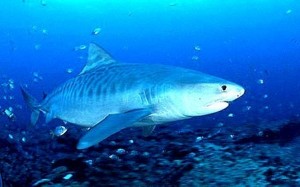 Ecotourism activities that use food to attract and concentrate wildlife for viewing have become a controversial topic in ecological studies. This debate is best exemplified by the shark dive tourism industry, a highly lucrative and booming global market. Use of chum or food to attract big sharks to areas where divers can view the dwindling populations of these animals has generated significant criticism because of the potential for ecological and behavioral impacts to the species. However, the debate has been largely rhetorical due to a lack of sufficient data to make any conclusions either way. Five University of Miami (UM) Rosenstiel School of Marine & Atmospheric Science researchers, Drs. Neil Hammerschlag, Jerald S. Ault and Jiangang Luo, and graduate students Austin Gallagher and Julia Wester, combined efforts to tackle this issue. In a paper published in the British Ecological Society’s Functional Ecology titled, “Don’t bite the hand that feeds: Assessing ecological impacts of provisioning ecotourism on an apex marine predator,” the team conducted the first satellite tagging study to examine the long-term and long range movement patterns of tiger sharks (the largest apex predator in tropical waters) in response to dive tourism. Video commentary commentary
Ecotourism activities that use food to attract and concentrate wildlife for viewing have become a controversial topic in ecological studies. This debate is best exemplified by the shark dive tourism industry, a highly lucrative and booming global market. Use of chum or food to attract big sharks to areas where divers can view the dwindling populations of these animals has generated significant criticism because of the potential for ecological and behavioral impacts to the species. However, the debate has been largely rhetorical due to a lack of sufficient data to make any conclusions either way. Five University of Miami (UM) Rosenstiel School of Marine & Atmospheric Science researchers, Drs. Neil Hammerschlag, Jerald S. Ault and Jiangang Luo, and graduate students Austin Gallagher and Julia Wester, combined efforts to tackle this issue. In a paper published in the British Ecological Society’s Functional Ecology titled, “Don’t bite the hand that feeds: Assessing ecological impacts of provisioning ecotourism on an apex marine predator,” the team conducted the first satellite tagging study to examine the long-term and long range movement patterns of tiger sharks (the largest apex predator in tropical waters) in response to dive tourism. Video commentary commentary
Green Travel Grows to Mexico, Caribbean, Hawaii and Costa Rica
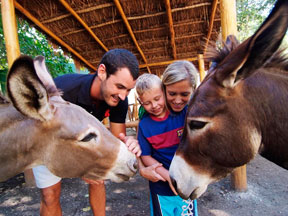 Apple Vacations is recognizing several environmentally friendly hotels & resorts in Mexico, the Caribbean, Hawaii and Costa Rica in honor of Earth Day on Sun. April 22. Apple Vacations’ Go Green hotel partners have implemented a variety of eco-conscious initiatives in the day-to-day operations of their resorts. For example, Sandos Caracol Eco-Resort and Spa in Cancun’s Riviera Maya was awarded the prestigious GOLD “TRAVELIFE AWARD” for environmental commitment. Sandos Caracol Eco-Resort and Spa’s environmental efforts include among other things 96 ecological rooms that reduce CO2 emission by 75%, Solar water heating, Use of biodegradable bottles throughout the resort and Wildlife conservation.
Apple Vacations is recognizing several environmentally friendly hotels & resorts in Mexico, the Caribbean, Hawaii and Costa Rica in honor of Earth Day on Sun. April 22. Apple Vacations’ Go Green hotel partners have implemented a variety of eco-conscious initiatives in the day-to-day operations of their resorts. For example, Sandos Caracol Eco-Resort and Spa in Cancun’s Riviera Maya was awarded the prestigious GOLD “TRAVELIFE AWARD” for environmental commitment. Sandos Caracol Eco-Resort and Spa’s environmental efforts include among other things 96 ecological rooms that reduce CO2 emission by 75%, Solar water heating, Use of biodegradable bottles throughout the resort and Wildlife conservation.
In all, Apple Vacations is recognizing 27 Go Green hotels, and brands include Apple Vacations customer favorites like Secrets Resorts & Spas, Dreams Resorts & Spas, Iberostar Resorts and Hyatt Resorts of Hawaii. Traveling green is easy and affordable with Apple Vacations. Seven all-inclusive nights in May and June at Sandos Caracol Eco-Resort and Spa start from an incredible $740 per person, including roundtrip, nonstop air from Dallas, hotel transfers and all meals and drinks. Prices per person based on double occupancy including round-trip charter airfare from Baltimore, Dallas, and Los Angeles via Air Tran, Sun Country, and Frontier Airlines or other US certified air carriers, round-trip airport/hotel transfers, hotel taxes and baggage handling, fuel surcharges, all pre-collected U.S. and foreign taxes and fees including September 11th Security Fee.
14 Tour Companies Earn Hawai‘i’s First-Ever Green Certification
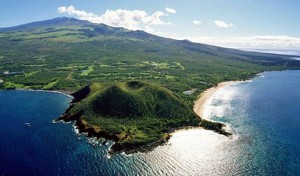 With the goal of encouraging more “green” tourism statewide, the Hawai‘i Ecotourism Association announced that 14 companies (list below) have earned the distinction of being Hawai‘i’s first-ever Certified Ecotour Operators. “We applaud these 14 ecotourism companies for their commitment to environmental sustainability and urge other tourism providers throughout Hawai‘i to follow their lead,” said Chris Colvin, HEA president. HEA developed the ecotourism certification program, the first in Hawai‘i, to help educate commercial tour operators on the responsible use of natural and cultural resources, support conservation and sustainability practices, and raise awareness among visitors. Colvin added, “The purpose of certification is to support, promote, educate, and strengthen on-the-ground tourism practices with respect to honoring and caring for our natural and cultural resources, resulting in better resource conservation, higher visitor satisfaction, and more community support for the visitor industry.” GOLD
Atlantis Adventures – O‘ahu, Maui, Hawai‘i
Trilogy Excursions – Maui
Volcano Discovery – Hawai‘i SILVER
Hawaiian Paddle Sports – Maui
Hike Maui – Maui
Jack’s Diving Locker – Hawai‘i
Kayak Kaua‘i – Kaua‘i
Kualoa Ranch – O‘ahu
Pacific Islands Institute – O‘ahu, Maui, Hawai‘i, Kaua‘i, Moloka‘i
Pacific Whale Foundation – Maui
Wild Side Specialty Tours – O‘ahu BRONZE
Annette’s Adventures – O‘ahu
Bike Hawai‘i – O‘ahu
Hawai‘i Forest & Trail –
With the goal of encouraging more “green” tourism statewide, the Hawai‘i Ecotourism Association announced that 14 companies (list below) have earned the distinction of being Hawai‘i’s first-ever Certified Ecotour Operators. “We applaud these 14 ecotourism companies for their commitment to environmental sustainability and urge other tourism providers throughout Hawai‘i to follow their lead,” said Chris Colvin, HEA president. HEA developed the ecotourism certification program, the first in Hawai‘i, to help educate commercial tour operators on the responsible use of natural and cultural resources, support conservation and sustainability practices, and raise awareness among visitors. Colvin added, “The purpose of certification is to support, promote, educate, and strengthen on-the-ground tourism practices with respect to honoring and caring for our natural and cultural resources, resulting in better resource conservation, higher visitor satisfaction, and more community support for the visitor industry.” GOLD
Atlantis Adventures – O‘ahu, Maui, Hawai‘i
Trilogy Excursions – Maui
Volcano Discovery – Hawai‘i SILVER
Hawaiian Paddle Sports – Maui
Hike Maui – Maui
Jack’s Diving Locker – Hawai‘i
Kayak Kaua‘i – Kaua‘i
Kualoa Ranch – O‘ahu
Pacific Islands Institute – O‘ahu, Maui, Hawai‘i, Kaua‘i, Moloka‘i
Pacific Whale Foundation – Maui
Wild Side Specialty Tours – O‘ahu BRONZE
Annette’s Adventures – O‘ahu
Bike Hawai‘i – O‘ahu
Hawai‘i Forest & Trail –
Hawai‘i HEA presented each honoree with an official seal of certification that can be publicly displayed at their place of business, on their website, and in their marketing materials to show proof of their commitment to sustainability and support for Hawai‘i’s environment. In addition, Lt. Gov. Brian Schatz presented each honoree with a proclamation of recognition. Earning the ecotourism certification by the 14 inaugural awardees was based on the following requirements designed by HEA to assess the extent of their “green” tour operations and environmental preservation efforts. • Provide a direct, personal experience of nature for customers • Have a written sustainability plan that guides the applicant’s operations and demonstrates commitment to HEA ecotourism principles • Contribute to conservation outcomes annually to statewide and/or local community-based environmental conservation initiatives • Contribute to the local communities in which the applicant operates • Demonstrate effective management on their operating principles regarding the environment, interpretation, consumer evaluation, marketing, and staff Each company has been certified as a Gold, Silver, or Bronze honoree as determined by a scoring system evaluating their ecotourism operations and principles. Gold honorees are certified for a three-year period. Silver and Bronze honorees can make adjustments to their operations and reapply next year for Gold status. The ecotourism certification program was developed with funding from a Hawai‘i Tourism Authority natural resources award. In-kind support was contributed by the University of Hawai‘i at Manoa’s College of Tropical Agriculture and Human Resources, Department of Natural Resources and Environmental Management, with Professor Linda Cox serving as project manager.
Marin Therapist Takes EcoTourism To High Ground
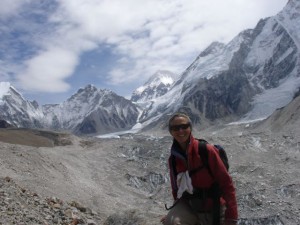 After a few minutes talking with Kathy Kapps you can sense
After a few minutes talking with Kathy Kapps you can sense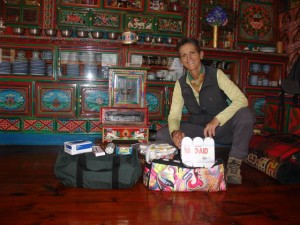 there’s something really unique about her. The tuned in Zen Shiatsu therapist and Marin resident is originally from the motor city of Detroit. She has been traveling back and forth to the Himalayan high mountain kingdom of Nepal since the early eighties. I happened to have met her up on Hill 88 in the Marin Headlands. She would say, “there is no happenstance.” She recently returned from Nepal, a journey she’s been making now for 7 years after a 15 year break. Several months ago I literally ran into her along a steep Marin trail above the Golden Gate Bridge, when she told me she was heading back to the magical kingdom. I wished her well – but what pleasantly surprised me weeks later was an email photo of a prayer flag she had placed for my mother. It turns out she places prayer flags at the Khumbu Glacier two days away from base camp at Mount Everest, the world’s highest mountain. She told me,”The memorial prayer flags for those lost loved ones are hung at the sacred memorial site at the end of the Khumbu Glacier. The sacred site is at the end of the whole huge Khumbu glacier and many people who died climbing Everest are memorialized there. My personal prayer flags for friends and family are hung at the foot of ‘Lady Everest.”
there’s something really unique about her. The tuned in Zen Shiatsu therapist and Marin resident is originally from the motor city of Detroit. She has been traveling back and forth to the Himalayan high mountain kingdom of Nepal since the early eighties. I happened to have met her up on Hill 88 in the Marin Headlands. She would say, “there is no happenstance.” She recently returned from Nepal, a journey she’s been making now for 7 years after a 15 year break. Several months ago I literally ran into her along a steep Marin trail above the Golden Gate Bridge, when she told me she was heading back to the magical kingdom. I wished her well – but what pleasantly surprised me weeks later was an email photo of a prayer flag she had placed for my mother. It turns out she places prayer flags at the Khumbu Glacier two days away from base camp at Mount Everest, the world’s highest mountain. She told me,”The memorial prayer flags for those lost loved ones are hung at the sacred memorial site at the end of the Khumbu Glacier. The sacred site is at the end of the whole huge Khumbu glacier and many people who died climbing Everest are memorialized there. My personal prayer flags for friends and family are hung at the foot of ‘Lady Everest.”
Audio clip: Adobe Flash Player (version 9 or above) is required to play this audio clip. Download the latest version here. You also need to have JavaScript enabled in your browser.
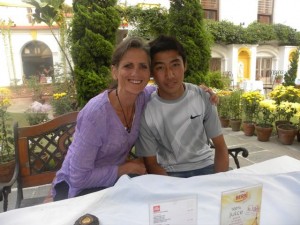 Kat as she is affectionately called not only places prayer flags, but also takes needed medical supplies to hospitals in the remote areas of the Solo Khumbu an area high in the Himalayas outside the ancient and busy city of Kathmandu.In addition to this she has also raised funds to contribute to the education of a college bound student who will be majoring in tourism. In her soon to be released book “The Inner Mandala” Kat writes about her own personal losses and discoveries. For close to thirty years Kat has been a practicing Zen Shiatsu therapist and instructor working in San Francisco and Marin county. Inspired by author and philosopher Dadaji whom Kat says profoundly changed her life for the better, she is initiating a new venture,“Lady Everest” for those who are interested in learning and exploring Mount Everest, the Himalayas and the Nepal region. By Richard Andrews
Kat as she is affectionately called not only places prayer flags, but also takes needed medical supplies to hospitals in the remote areas of the Solo Khumbu an area high in the Himalayas outside the ancient and busy city of Kathmandu.In addition to this she has also raised funds to contribute to the education of a college bound student who will be majoring in tourism. In her soon to be released book “The Inner Mandala” Kat writes about her own personal losses and discoveries. For close to thirty years Kat has been a practicing Zen Shiatsu therapist and instructor working in San Francisco and Marin county. Inspired by author and philosopher Dadaji whom Kat says profoundly changed her life for the better, she is initiating a new venture,“Lady Everest” for those who are interested in learning and exploring Mount Everest, the Himalayas and the Nepal region. By Richard Andrews
2011 Ecotourism and Sustainable Tourism Conference:
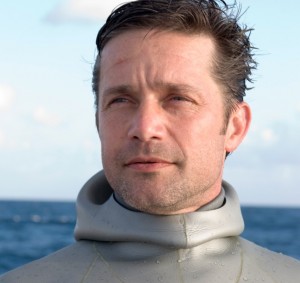 Five years strong, the Ecotourism and Sustainable Tourism Conference (ESTC) has even more to offer in 2011. A unique annual conference based on sharing practical solutions to advance sustainability in the tourism industry, the Ecotourism and Sustainable Tourism Conference draws everyone from the mayor of America’s most sustainable city to the founder of the world’s largest adventure company, top authors to business visionaries. This year the Ecotourism and Sustainable Tourism Conference will be held on Hilton Head Island, South Carolina, September 19-21. You’ll be guaranteed a wide variety of tourism industry pioneers and influencers sharing inspiring, innovative ideas and solutions in today’s tourism; will you be part of the over 500 business leaders there? Hilton Head Island has a long history of environmental sensitivity as it strives to preserve its natural beauty while thriving as a popular American tourism destination. Conference attendees at ESTC will be able to participate in hands-on field sessions around the island to see local sustainability initiatives in action from beach renourishment to sustainable golf courses. A culinary showcase, special interest workshops, and a variety of speakers and sessions address the many facets of ecotourism from those in the know. Pre-conference workshops on authentic ecolodges and sea island ecotourism and sustainability are the perfect compliment to the conference tracks of business sustainability practices; conservation and communities; partnerships in press, policy, and politics; and places and experiences. Don’t miss keynote speaker Fabien Cousteau, ocean explorer, environmental activist, and grandson of legend Jacques Cousteau. Source: The Hound 2010 Ecotourism and Sustainable Tourism Conference
Five years strong, the Ecotourism and Sustainable Tourism Conference (ESTC) has even more to offer in 2011. A unique annual conference based on sharing practical solutions to advance sustainability in the tourism industry, the Ecotourism and Sustainable Tourism Conference draws everyone from the mayor of America’s most sustainable city to the founder of the world’s largest adventure company, top authors to business visionaries. This year the Ecotourism and Sustainable Tourism Conference will be held on Hilton Head Island, South Carolina, September 19-21. You’ll be guaranteed a wide variety of tourism industry pioneers and influencers sharing inspiring, innovative ideas and solutions in today’s tourism; will you be part of the over 500 business leaders there? Hilton Head Island has a long history of environmental sensitivity as it strives to preserve its natural beauty while thriving as a popular American tourism destination. Conference attendees at ESTC will be able to participate in hands-on field sessions around the island to see local sustainability initiatives in action from beach renourishment to sustainable golf courses. A culinary showcase, special interest workshops, and a variety of speakers and sessions address the many facets of ecotourism from those in the know. Pre-conference workshops on authentic ecolodges and sea island ecotourism and sustainability are the perfect compliment to the conference tracks of business sustainability practices; conservation and communities; partnerships in press, policy, and politics; and places and experiences. Don’t miss keynote speaker Fabien Cousteau, ocean explorer, environmental activist, and grandson of legend Jacques Cousteau. Source: The Hound 2010 Ecotourism and Sustainable Tourism Conference
There’s still time to register for this year’s Ecotourism and Sustainable Tourism Conference, with student discounts and day passes available. Families are also welcome. Be part of the visionaries leading tourism towards a more sustainable future while meeting others in the industry with similar goals. It’s no wonder that ESTC is known as an unparalleled networking and knowledge-sharing experience.
Scale back tourism in Venice, say ecologists
Ecologists are warning of the death of Venice  Venice is under threat from mass tourism, a leading Italian conservation group has warned. According to AFP, Italia Nostra says that rampant aquatic transport, caused by the influx of visitors to the city, is slowly eroding its waterways, gradually turning the famous Venetian lagoon into a bay. The NGO’s head, Alessandra Mottola Molfino, said the current daily average of 60,000 visitors was “too high for such a fragile city”. “Venice is really under threat,” Mr Mottola Molfino remarked. With the city’s delicate ecosystem under threat, Italia Nostra has recommended a move to drastically cut the number of tour groups to the city, even if the reduction “momentarily leads to a drop in trade flows”. The environmental group has also suggested the city concentrate on ecotourism rather than on mass tourism alone. Meanwhile, plans by Venetian authorities to build a nearby city, complete with offices, a casino, warehouses and a high-speed rail link, have been slammed by Italia Nostra. “We must find a balance between immediate needs and the future to ensure sustainable development,” Mr Mottola Molfino said. Source Travel Blackboard
Venice is under threat from mass tourism, a leading Italian conservation group has warned. According to AFP, Italia Nostra says that rampant aquatic transport, caused by the influx of visitors to the city, is slowly eroding its waterways, gradually turning the famous Venetian lagoon into a bay. The NGO’s head, Alessandra Mottola Molfino, said the current daily average of 60,000 visitors was “too high for such a fragile city”. “Venice is really under threat,” Mr Mottola Molfino remarked. With the city’s delicate ecosystem under threat, Italia Nostra has recommended a move to drastically cut the number of tour groups to the city, even if the reduction “momentarily leads to a drop in trade flows”. The environmental group has also suggested the city concentrate on ecotourism rather than on mass tourism alone. Meanwhile, plans by Venetian authorities to build a nearby city, complete with offices, a casino, warehouses and a high-speed rail link, have been slammed by Italia Nostra. “We must find a balance between immediate needs and the future to ensure sustainable development,” Mr Mottola Molfino said. Source Travel Blackboard
Habitat for Humanity Partners with Asia Pulp & Paper to Create Its First Eco-Tourism Village in the World
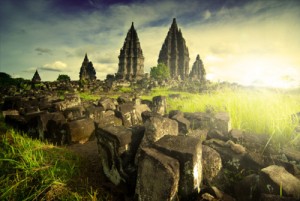 Project will make Indonesian history, culture accessible to international visitors Habitat for Humanity Indonesia today announced it is partnering with Asia Pulp & Paper (APP) to create Habitat’s first eco-tourism village of more than 420 homes and guest accommodations near some of Indonesia’s most picturesque ancient temples. The development will take place in the village of Soran, located near the famous Prambanan Temple, a UNESCO World Heritage Site built around 850 AD. The village is also located near Mount Merapi, the nation’s most famous volcano, which erupted last year. Soran has a long tradition of creating music and crafts, but 60 percent of families there live below the poverty line. The project will improve housing for most villagers, while establishing a sustainable, eco-friendly hospitality business built on the community’s historic cultural traditions.
Project will make Indonesian history, culture accessible to international visitors Habitat for Humanity Indonesia today announced it is partnering with Asia Pulp & Paper (APP) to create Habitat’s first eco-tourism village of more than 420 homes and guest accommodations near some of Indonesia’s most picturesque ancient temples. The development will take place in the village of Soran, located near the famous Prambanan Temple, a UNESCO World Heritage Site built around 850 AD. The village is also located near Mount Merapi, the nation’s most famous volcano, which erupted last year. Soran has a long tradition of creating music and crafts, but 60 percent of families there live below the poverty line. The project will improve housing for most villagers, while establishing a sustainable, eco-friendly hospitality business built on the community’s historic cultural traditions.
The development will share the area’s natural and cultural treasures with the world by creating accommodations for tourists who wish to tour the sacred temples, visit nearby natural landmarks or enjoy the cultural performances. “This is the first Habitat project in the world that creates shelter and economic opportunity for an entire community, and it is precisely the kind of project needed to combat Indonesia’s poverty,” said James Tumbuan, National Director of Habitat for Humanity Indonesia. “This unique program not only improves housing for most of the community, it also allows Soran villagers to economically benefit from the art and culture they have preserved for centuries, and to share it with the world.” Aida Greenbury, sustainability managing director for APP, said the company’s support of the project is part of APP’s ongoing commitment to preserving Indonesia’s national treasures – both natural and cultural. “The Soran project will help the world better understand Indonesian culture by making it more accessible to international visitors,” she said. “It will protect national treasures while creating sustainable economic opportunities. We are proud to add Soran to our list of commitments. With it, we plant another seed that will flourish into lasting prosperity for the nation and the world.” The three-year project will outfit family homes with additional space and facilities to accommodate eco-tourists who visit the historic Central Java area. The homes will have either: • Guest quarters where visitors can sleep. • Laundry facilities to wash guests’ clothes and bedding. •
Expanded kitchen facilities where guest meals can be prepared. Homes will also be made earthquake-proof, and 20 percent of APP’s annual contribution to the project is being set aside for ongoing disaster relief. While details of the development initiatives are still being finalized with community members, the initial plan is to train more than 250 villagers to operate eco-tourist accommodations: • 50 villagers will be trained on laundry management. • 100 villagers will be trained to properly prepare traditional foods for visitors. • 100 families will be trained on cultural performance and marketing traditional arts. In addition, several hundred villagers will be trained in disaster risk mitigation. “Our husbands are farmers and laborers. But I want my children to go to the university,” said Partini (many Indonesians only use one name), a Soran resident. “As a housewife, I can do crafts and arts. Sometimes, housewives practice [the traditional performance art of] gejog lesung. But we don’t know how to make gejog lesung into a money tree or make our crafts marketable. I hope this program can help me and others improve our family incomes. We will work hard since we all share the same dream: moving forward.” Work has been expected to begin on the new development last year, but was delayed because of Merapi’s eruption. Soran was covered in volcanic dust, but villagers completed a cleanup with the help of cleanup kits and cleaning materials donated by APP. As with all of its programs, Habitat Indonesia will engage community leaders, local stakeholders, and the villagers themselves in all stages of the development – from planning through construction.
More Ecotourism

